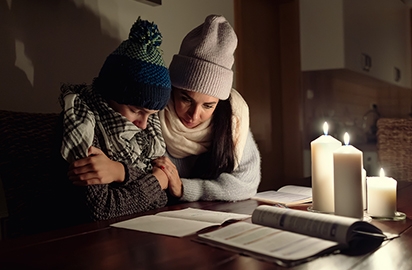Choosing a portable generator

A portable generator can be invaluable during an extended power outage. It will provide the electricity needed to light and warm your home and to use essential appliances and devices. Thinking of getting one? Read on for a concise buyer’s guide designed to help you find the best generator for you.
The 3 main criteria to consider when buying a generator
Before you rush out to the store, you’ll want to figure out how much wattage you need, what type of fuel you want to use, and whether you need a standard or inverter generator.
How powerful do I need my portable generator to be?
Generators typically range in power from 1,000 to 14,000 watts. So how powerful does yours need to be? It depends on your setup and the appliances and devices that will be connected to the generator. To calculate how much power your home needs, just add up the wattage required for each of your appliances and devices, then add a 25% safety margin (to cover the extra power it takes to start up appliances) and you’re all set! The following table shows the typical wattage required to power your basic home appliances..
Heating | Approximate wattage required |
|---|---|
Oil-fired central heating | 1,200–1,800 (furnace and fan) |
Gas-fired central heating | 1,200–1,300 (fan) |
lectric heating | 1,500 (per 1.5m [5ft] baseboard heater) |
Other appliances | Approximate wattage required |
|---|---|
Water heater | 3,000–4,500 |
Sump pump | 1,000–3,000 |
Refrigerator/freezer | 600–2,000 |
Stove/range | 1,500 (per element) |
Electric light bulb | 60–150 (per bulb) |
What kind of fuel should I choose?
Some generators run on gasoline, others on gas (natural or propane) or a combination of both. However, most portable home generators, including those usually used in emergencies, run on gasoline.
Should I get a standard or inverter generator?
What’s the difference? An inverter generator (also called a voltage regulator) will allow you to safely connect devices that are sensitive to electrical fluctuations, such as your computer, a flat-screen TV, or a smart fridge. If you’re mainly planning to use your generator at a cottage or some other place where you don’t have any of the above devices, then you can choose a standard generator.

Other criteria to consider, and why, when choosing a good generator
- Noise: Choose a noise level below 65 decibels, which is lower than the level of human speech. That way you’ll be able to hear yourself speak.
- Run time (autonomy): Varies from 5 to 11 hours on a full tank of gas or oil. If the nearest fuel station is far away, run time can quickly become an issue. There are also risks associated with storing a can of gasoline at home.
- Weight: If you’ll be moving your generator around a lot (for example, for outdoor activities or camping), you might prefer having a lighter one.
- 12-volt charger: Some models can be used to charge a car or boat battery, allowing you to power several types of devices.
- Automatic idle control: Reduces noise and extends the lifespan of your generator.
- Electric starter: Starts the generator with the push of a button. However, most models are equipped with a pull start (manual) system.
- Warranties: They tend to be similar across products, except for some Chinese brands that have not yet proven reliable. (Consider yourself warned!)
- Certification: Choose a generator certified by the Canadian Standards Association (CSA), which attests to its environmental compliance and safety in Canada and the United States.
Before making your pick, you can also read CAA-Quebec’s Residential Advisory Services and the generator comparison from Protégez-Vous (in French only).
How do I use a generator safely?
Although they’re very practical, generators can be dangerous. Every year, people die or are hospitalized (mainly for asphyxiation) due to abusive or improper use of a generator. That’s why it’s important to install carbon monoxide detectors in your home and check the batteries regularly (ideally at the end of each season when you’re checking your smoke detectors).
Here are the key warnings or recommendations from manufacturers:
- Gas or gasoline generators are not designed to be used inside.
- Generators can short-circuit and start a fire if they're not properly connected.
- Don’t wait for an emergency before learning how to use your generator.
- Place your generator outside in an area that is dry (especially in case of flooding), well ventilated, and away from doors and windows. It should also be protected from the elements so the carburetor or breather doesn’t freeze.
- Before refuelling, turn your generator off and allow it to cool. Store fuel well away from your generator as it can get extremely hot while operating.
- Never overload a generator. Plug devices in one by one, and respect the generator’s wattage. If you’re using extension cords, make sure they’re specifically designed for generators.
- Store your generator in an appropriate location (ideally in a shed) to reduce the risk of fire. Your home insurer will thank you.
How can I heat my home if I don’t have a generator?
There are several auxiliary heaters on the market, including a variety of fireplaces and stoves (wood, gas, or pellet). Installing one can definitely help prepare you for a power outage, especially in the winter.

Benefit from personalized advice
Do you have questions about your home, need specific information, or are you looking for referrals to find an Approved Supplier?